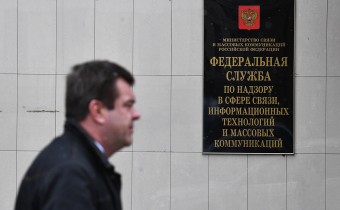Roskomnadzor failed to lay the legal base for the massive blocking of IP addresses
 On April 23, 2018, Roskomnadzor published on the government portal Regulation.gov.ru a draft order “On approving the procedure for identifying information resources in order to take measures to restrict access to information resources”. According to the draft, the document added another reason for entering an information resource into the register of prohibited resources: these are “judicial decisions and rulings on cases of administrative offenses that have entered into legal force”. According to the document, Roskomnadzor has the right to independently set the network address, domain name and page pointer containing the prohibited information, “in case of errors”.
On April 23, 2018, Roskomnadzor published on the government portal Regulation.gov.ru a draft order “On approving the procedure for identifying information resources in order to take measures to restrict access to information resources”. According to the draft, the document added another reason for entering an information resource into the register of prohibited resources: these are “judicial decisions and rulings on cases of administrative offenses that have entered into legal force”. According to the document, Roskomnadzor has the right to independently set the network address, domain name and page pointer containing the prohibited information, “in case of errors”.According to experts , in this way Roskomnadzor is trying to legalize the actions that it has been carrying out since April 16, 2018, blocking millions of IP addresses for the task at hand - the degradation of the Telegram messenger in the Russian Federation. Roskomnadzor itself assures that the only purpose of the new document is to correct mistakes in the incorrect spelling of domain names in court decisions, and the order does not pursue other goals.
“After a series of subnetting locks, many industry lawyers paid attention to the fact that there is no legal basis for such actions by Roskomnadzor,” Irina Levova, director for strategic projects at the Internet Research Institute, said two weeks ago when the project from Roskomnadzor was publicly available. “Probably, the supervisory authority realized that blocking all IP addresses occurs on rather dubious grounds, and decided to quickly and privately eliminate this gap and thus put the legal framework under their actions.”
If the regulator was going to hold the document from the first time through the expert council, then it failed. As the Kommersant newspaper learned, the project received a negative assessment from experts of the Svyaz and IT working group of the Expert Council under the Government of the Russian Federation. They concluded that the draft order “provides the agency with an unreasonable opportunity to block any resource.”
')
According to the experts, Roskomnadzor "receives and completely replaces the functions of the bodies that must establish the fact that the information is classified as prohibited."
In addition, the following comments were made to the document:
- he does not describe the procedure for identifying information resources in order to take measures to restrict access (“It remains unclear what information will be considered a“ benchmark ”and how to carry out identification without“ reference information ”,” is explained in the conclusion);
- It is not known by what criteria they check whether the information on the resource corresponds to the one that became the basis for blocking: for example, it should be identical or simply match in meaning.
Thus, the working group of the Expert Council decided that the project requires processing.
The project has an end date for public comment on May 7, 2018. The conclusion of the working group was sent to Roskomnadzor to the head of the department, Alexander Zharov, on May 3, and now it is being studied. Then, taking into account the comments and suggestions received, the draft order will be adjusted and re-posted on the portal, the press service of Roskomnadzor reported.
Meanwhile, the number of victims of the "blockade of the Runet" continues to grow. Roskomnadzor received about 46 thousand complaints with complaints about unauthorized blocking of Internet addresses. According to the head of the Ministry of Communications and Mass Media, Nikolai Nikiforov, these decisions should be considered on an individual basis and only through the court : “There are reports that, within the framework of the blocking, addresses are blocked that are not related to the organizer of information dissemination, but are related to other resources. But these appeals must be considered individually, ”said Nikiforov. - If there is information that such a problem is systemic, then such actions need to be challenged in court. It is the judicial order in a legal state that is the basis for such complex situations to be analyzed. If some resources believe that they are blocked improperly and they have some sort of assessment of the damage they have suffered, they can turn to the courts to challenge this decision and even consider the issue of compensation for the damage they have suffered. But this must again be proved in court. ”
The lawyers of Roskomsvoboda prepared a claim form for submission by organizations regarding illegal actions of the supervisory authority. The lawsuit can be submitted in person, by mail or through the electronic filing system.
Source: https://habr.com/ru/post/356392/
All Articles